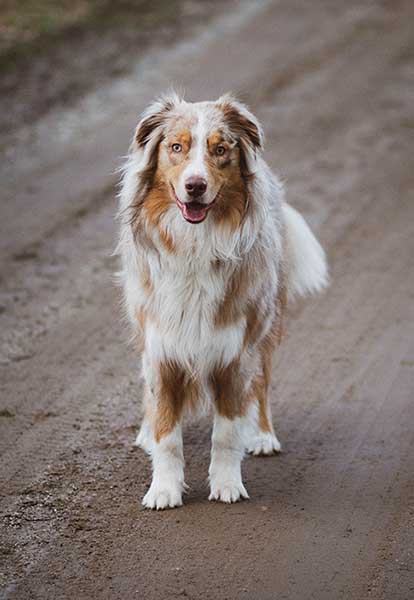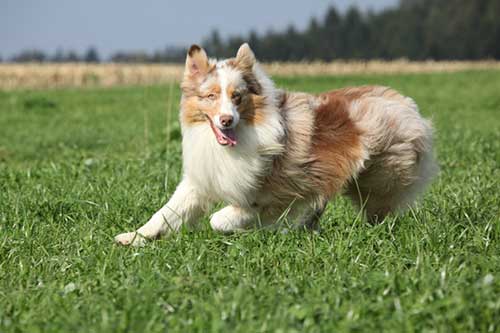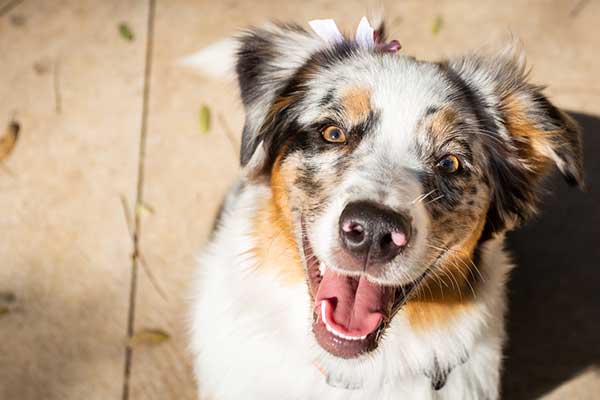Australian Shepherds, also known as Aussies, are adorable dog breeds known for their powerful herding instincts.
These dogs are also very intelligent, highly energetic, and incredibly easy to train. Such features together make Aussies one of the best family dogs.
But if you already own an Australian Shepherd and are planning to bring another dog home or if you have a different breed and are considering blessing him with an Aussie as a companion, you could be wondering if the dogs will get along. So, do Aussies get along with other dogs?
Yes, Australian Shepherds generally get along with other dogs. Since Aussies are naturally a friendly breed, the dog tends to coexist harmoniously with other dogs.
However, the friendly nature of Australian Shepherds doesn’t necessarily mean that your Aussie will take to any dog he interacts with. Remember that these dogs have strong herding instincts and high-energy personalities. That combination may often result in scuffles with other dogs, particularly if the dogs were not properly introduced.
Fortunately, there are certain precautions you can take to ensure your Australian Shepherd gets along with any dog breed you wish to raise alongside him.
This article shall offer more insights into Aussies and their general interactions with other dog breeds. But first, let’s fully familiarize ourselves with what this breed is all about.
Table of Contents
What Is An Australian Shepherd?
The Australian Shepherd is a breed of herding dog developed around the 1800s. Despite its name, the dog was developed in the United States.
Breed information suggests that Aussies descended from numerous herding dogs, including collies imported into California alongside sheep brought in from Australia and New Zealand.
Over the years, the Australian Shepherd has become one of the most sought-after dog breeds. And although originally used almost entirely for herding, this breed has since acquired additional roles. In the United States, Aussies are now more commonly used for companionship.
Quick Facts About The Australian Shepherd
| Name: | Australian Shepherd |
| Nickname: | Aussie |
| Place Developed: | California, United States |
| Period Developed: | Around the 1800s |
| Breed Classification: | Working Dog (Sheep Herding) |
| Breed Size: | Medium |
| Height at the Withers: | 20 to 23 inches (51 to 58 centimeters) for dogs and 18 to 21 inches (46 to 53 centimeters) for bitches |
| Weight: | 35 to 70 pounds (16 to 32 kilograms) |
| Coat Characteristics: | Moderately long and durable |
| Coat Color: | Blue merle, red merle, solid black, and solid red; with white markings and/or tan points |
| Temperament: | Intelligent, Energetic, Playful, and Adaptive |
| Common Health Problems: | Hip dysplasia, elbow dysplasia, collie eye anomaly, colobomas, cataracts, and progressive retinal atrophy |
| Average Lifespan: | 12 to 13 years |
| Year Recognized by the American Kennel Club (AKC): | In the 1990s |

Origin of the Australian Shepherd
The Australian Shepherd may have been developed in the 1800s. But the breed’s history goes way back.
According to unverified reports, part of the Aussie’s descendants were pastoral dogs imported into North America to herd Spanish flocks in the 1500s.
However, the Aussie as we know it today was developed in California, United States, in the 19th century. The breed was developed exclusively to assist California shepherds in herding their sheep.
Australian Shepherds became incredibly popular in California and throughout ranches in the western US, thanks to their ability to herd sheep and other livestock.
In 1979, the breed attained full recognition by the United Kennel Club. AKC recognition followed in the 1990s. The breed has since been recognized by other globally renowned canine clubs, including Fédération Cynologique Internationale.
Physical Appearance of the Australian Shepherd
The Australian Shepherd is a medium-sized working dog breed that measures 18 to 23 inches at the withers and weighs 35 to 70 pounds.
Aussies sport a double coat that’s relatively long and wavy. Their undercoat is moderately dense and the topcoat is a bit coarse.
The breed can sport a range of colors and markings. But the most common ones include blue merle, red merle, solid red, and solid black. Each of these colors can feature white markings and/or tan points.
Australian Shepherd tails can be long or naturally bobbed. However, the tail is traditionally docked.

Temperament of the Australian Shepherd
The Australian Shepherd is a highly intelligent, active, and playful dog. The breed is also loyal and obedient but can be highly protective of his owners.
Aussies adapt well to apartment living, which explains why they’ve become more popular for companionship than the role they were originally bred for – sheep herding.
Are Australian Shepherds Good With Other Dogs Around?
Having sufficiently introduced Australian Shepherds, we can now go back to our main question and offer a conclusive answer.
We already mentioned that Aussies generally do get along with other dog breeds. But to settle this question decisively, we should understand the qualities that determine how easy Australian Shepherds (or any other dog breed for that matter) will get along with other dogs.
1. Australian Shepherds Are Playful and Active
Australian Shepherds are famous for their playful and active nature. These dogs can turn an otherwise boring day into a beehive of activities. That can be particularly useful if you’re a family with young children.
Remember, you want a dog that can jump and bounce around with your kids, not a couch potato who will only respond with a blank stare at every request to play fetch.
But a dog’s playfulness isn’t only beneficial to families raising young kids. It can also be useful in getting two otherwise hostile breeds to live harmoniously.
Playful behaviors can help diffuse tension between dogs, thereby averting confrontations. And that’s precisely what makes Aussies great with other dogs too.
View this post on Instagram
2. Australian Shepherds Are Friendly and Affectionate
Not only are Australian Shepherds energy-filled dogs. The breed is also friendly and affectionate. Aussies have a natural tendency to take to new family members, ranging from humans to canines and other pets.
That begs the question, are Australian Shepherds good with small dogs?
Absolutely! Thanks to their friendly and animated personality, Aussies are definitely a top recommendation for families with small dogs. Aussies’ playfulness will come in handy in keeping their smaller companions active, while their affectionate nature will help to shield the smaller dogs from harm.
3. Australian Shepherds Are Very Intelligent
Intelligence plays one of the biggest roles in determining whether a dog breed will coexist with other dogs in the same space or not. Fortunately, this is another area where Australian Shepherds tick the box.
Aussies boast an incredible intelligence score compared to many dog breeds. Due to their high intelligence, these dogs can easily discern potentially dangerous situations and make informed decisions fast.
When living in a family with other dogs, your Australian Shepherd will readily deploy his intelligence to establish his position in the pack. He will be smart enough to know the dogs he can occasionally mess up with and those he wouldn’t want to annoy. This can be useful in averting undue confrontations.
Intelligence also reflects favorably when it comes to training. Smart dogs are easier to train and socialize. That’s due to their relatively high attention span, learning abilities, and memory. So, even if your Australian Shepherd wasn’t naturally friendly, the mere fact that the dog is intelligent would still make it easy to train him to get along with his other furry housemates.
4. Australian Shepherds Are Less Intimidating
We’ve already explained that Australian Shepherds are more friendly than aggressive. That alone is enough reason to consider raising an Aussie alongside other dogs.
Besides, Australian Shepherds are not exactly intimidating. That’s due to their relatively small sizes.
Note that Aussies are classified as medium-sized dogs. So, their size is unlikely to scare away other medium and smaller dog breeds. Unfortunately, we cannot say the same of breeds like German Shepherds and Great Danes.
View this post on Instagram
5. Australian Shepherds Are Social Dogs
The fundamental reason behind the development of Australian Shepherds may also clue us in on the ease with which this breed can get along with other dogs. Having been bred for herding sheep, Aussies naturally appreciate company.
It’s understandable that the dogs had to occasionally intimidate the animals to earn their obedience. However, this was only intended to get the livestock to comply. On the contrary, Australian Shepherds were more inclined to protect the livestock in their custody than scare them away.
So, having originally lived in the company of large herds of livestock, the Australian Shepherds are naturally given to love companions. And that’s another fact that makes them potentially able to live harmoniously with other dogs.
Do Australian Shepherds Like Other Dogs?
Granted, Australian Shepherds generally get along with other dogs. But does this mean your Aussie will automatically like his new companion?
Well, there’s no direct answer to that question, as it pretty much depends on your dog.
While Australian Shepherds are generally sweet around fellow canines, every animal is unique. So, there’s a high chance that your Aussie may not like other dogs.
Why do Aussies not like other dogs?
Aversion to other dogs is usually a major problem with Australian Shepherds that have not been duly trained or socialized. Inadequate training and/or socialization may lead to unwarranted jealous behavior.
Perhaps you’ve always wondered, are Aussies jealous dogs?
Any dog can get jealous if not well trained and socialized. Jealous behavior can assume any form, ranging from competition for their owner’s attention to fights over food and many other kinds of household squabbles.
Also, like any dog, your Australian Shepherd will not take kindly the advances of a total stranger. That includes both human and canine strangers. The dog’s defensive instincts may kick in, causing him to lash out at the other person or dog.
Another reason that could prevent your Australian Shepherd from getting along with other dogs relates to his herding instincts. Aussies are notorious for nipping at the ankles, a herding habit they deployed to get livestock to move in a particular direction. Unfortunately, many dogs may interpret this behavior as an act of aggression and fight back.
The following are other reasons your Australian Shepherd may not get along with another dog;
- Stress and anxiety
- Fear
- Frustration
- Territoriality
- Medical condition
View this post on Instagram
Do Australian Shepherds Need Another Dog?
Australian Shepherds can get along with other dogs, alright. But do they need a companion?
Again, this depends on your dog. Before bringing another dog to a home with a resident Aussie, examine your pooch’s personality carefully to ensure he’s truly the kind that loves companionship.
It’s also important to get your Aussie a compatible breed.
The following are some of the dog breeds that go well with Aussies;
- Bernese Mountain Dog
- Border Collie
- Beagle
- Golden Retriever
- Labrador Retriever
- Husky
- Havanese
- Boston Terrier
- Irish Setter
As you search for the best companion dog for your Australian Shepherd, also keep your eyes out for breeds that would be most incompatible with your Aussie. Ideally, these include naturally aggressive breeds like pit bulls, Chihuahuas, and dachshunds.
Most importantly, remember to introduce your Australian Shepherd properly to the newcomer. This can be done gradually over a couple of weeks.
On the first day, you could bring both dogs out on a leash and observe how they behave in each other’s presence. Obviously, the resident dog is bound to display some hostility. Any signs of fear on the newcomer are your cues to split the dogs and proceed with the introduction another day.
As the animals gradually become accustomed to one other’s sights and scents, they’ll eventually get more comfortable in each other’s presence. You can then use your best judgment to know when to let them play freely.
Last but not least, ensure the animals receive adequate stimulation always. This will help release pent-up energy, thereby reducing scuffles resulting from play aggression.
Are Miniature Australian Shepherds Good With Other Dogs?
Australian Shepherds come in standard or miniature sizes. Miniature Aussies measure about 14 to 18 inches at the withers and weigh approximately 20 to 40 pounds.
But despite their size differences, all Aussies share similar personality traits. That begs the question, are mini Australian shepherds good with other dogs too?
Yes! Miniature Aussies are just as excellent with other dogs as their standard-sized cousins.
View this post on Instagram
Conclusion
Australian Shepherds are intelligent, sweet, playful, and social dogs. A combination of these features makes the dogs able to live harmoniously with other dogs in the same space. So, if you’ve been considering getting your Aussie a companion, then by all means go ahead.
Checkout Our Favorite Dog Products
1. BEST PUPPY TOY
We Like: Snuggle Behavior Toy with Heart Beat & Heat Pack – Ideal toy for new puppies.
2. BEST DOG TRAINING PROGRAM
We Like: Doggy Dan The Online Dog Trainer – Stop any dog problem and raise the perfect puppy with The Online Dog Trainer.
3. BEST DOG PUZZLE TOY
We Like: Outward Hound Interactive Puzzle Toy – Every dog loves chasing squirrels at the park. The Outward Hound Hide-a-Squirrel Puzzle Toy gives your dog the same feeling as though he was outdoors chasing live squirrels.
4. Best Bone Broth for Dogs
We Like: (Solid Gold – Human Grade Bone Broth for Dogs) – Simmered Beef Bone Broth With Turmeric Provides A Nutrient-Dense And Flavorful Addition To Your Dog’s Meal + Rich In Natural Collagen From Beef Bones.
5. Best Multivitamin for Dogs
We Like: PetHonesty 10-For-1 Multivitamin – 10 Benefits in 1 Daily Treat – These Multivitamin Snacks combine a well-rounded blend of the most essential vitamins and supplements including glucosamine, probiotics, vitamins and omegas, for dogs’ overall daily health.



